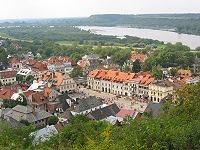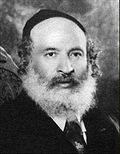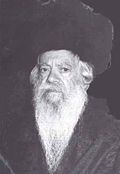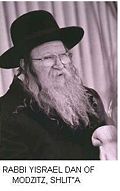- Modzitz (Hasidic dynasty)
-
Modzitz or Modzhitz is the name of a Hasidic group within Orthodox Judaism that derives its name from Modrzyce, one of the boroughs of the town of Dęblin, Poland, located on the Vistula River. The rabbis of this dynasty have the family name of "Taub".
Followers of this group are known as Modzitzer Hasidim and are now based mainly in Bnei Brak, where their Rebbe lives, and Jerusalem in Israel. They also have a smaller following in Brooklyn, Monsey, New York, and Far Rockaway, Queens, Los Angeles, California and Toronto, Canada.
Rebbe Yechezkel Taub of Kuzmir (1755-1856)
The town of Kuzmir, known in Polish as Kazimierz Dolny
The dynasty started with Rebbe Yechezkel Taub of Kuzmir, (1755–1856), who established yeshivas and a type of Hasidic teaching that was similar to that of his rebbes, the Seer of Lublin and the Kozhnitser Magid, and distinct from the Hasidism of Kotzk.
Rebbe Shmuel Eliyahu Taub of Zvolin
Upon the death of Rebbe Yechezkel Taub of Kuzmir in 1856, his son, Rebbe Shmuel Eliyahu Taub of Zvolin, Poland, succeeded him. He excelled in Torah scholarship and creating Hasidic songs. He was called Menagen mafli pla'os Hebrew for "[a] wondrous musical talent". When he died in 1888,[1] his first son Rabbi Moshe Aharon (1837 - March 17, 1918) succeeded him as Rebbe of Zvolin, while his second son, Rebbe Yisrael, went on to found the actual Modzitz Chasidic dynasty.
Rebbe Yisrael Taub (1849-1920)
Rebbe Yisrael Taub, second son of Rebbe Shmuel Eliyahu Taub of Zvolin, was born in 1849. In 1888 he succeeded his father as a rebbe of the Zvoliner chasidim. In 1891 he settled in Modrzyc, a village near the town of Demblin, Poland.[2] He became known as the Modzhitzer Rebbe (after his place of residence), thus establishing the dynasty of Modzhitz. He composed many melodies that are still sung by Chasidim and others today. He suffered from diabetes and in 1913 he travelled to Professor Israel in Berlin. The only way to save his life was by amputating his gangrenous leg (a consequence of diabetes). Before the operation, the rebbe observed the beautiful Berlin architecture which upset him by comparison with the desolation of the holy city of Jerusalem. During the operation he composed his epic masterpiece based on the words of Ezkero (recited on Yom Kipur).[3] Modzhitzer chasidim sing this tune each year when they gather to commemorate his yortseit.
His teachings on Breishis, Shemos and Vayikra have been collected in his work Divrei Yisrael. Unfortunately, the writings on Bamidbar and Devarim were lost.
When he died on 24 November 1920, he was succeeded by his son Rebbe Shaul Yedidya Elazar Taub.
Rebbe Shaul Yedidya Elazar Taub (1886-1947)
Rebbe Shaul Yedidya Elazar Taub was born on 20 October 1886. He guided his Chassidim in Poland until 1938 when he fled Poland due to Nazi persecution. He travelled to Vilna, Lithuania, Russia and from there made his way to Japan. Eventually, with the help of some Modzitzer Chassidim, he and some family members reached the shores of San Francisco and then moved to Brooklyn, New York in 1940. It was during his stay in Brooklyn that Rebbe Shaul Yedidya Elazar became popular and helped rebuild Modzitz. He was a gifted songwriter and wrote over 1,000 Chassidic melodies. He had an intense love for the Land of Israel, and even foresaw the coming of the State of Israel. He was unable to see the realization of his prediction, and he died on November 29, 1947, the day the UN voted to create the State of Israel. He was the last person to buried on the Mount of Olives until it was liberated in 1967. His teachings have been collected in the volumes of Imrei Shaul and Yisa Bracha. He was succeeded by his oldest son, Rebbe Shmuel Eliyahu Taub.
Rebbe Shmuel Eliyahu Taub (1905-1984)
Rebbe Shmuel Eliyahu was born in Lublin, Poland on 9 February 1905. In 1935, Rebbe Shaul Yedidya Elazar and his son Rabbi Shmuel went on a pilgrimage to the then British Mandate of Palestine. While they were there R. Shmuel fell in love with the Land of Israel and asked his father if he could stay there. His father agreed and within a year Rabbi Shmuel's wife and their child came over to Israel. After his father's death in 1947 he succeeded his father as the Modzitzer Rebbe, to be known later as the Imrei Eish ("Words of Fire"). He continued the traditions of Modzitz both as a composer and Torah scholar. He died on 6 May 1984 (4 Iyar 5784), when he was succeeded by his only son, Rebbe Yisrael Dan Taub. His teachings have been recently published in a sefer under the title Imrei Eish.
Rebbe Yisrael Dan Taub (1928-2006)
Rebbe Yisrael Dan was born in 1928 in Warsaw, Poland, and died on 16 June 2006 (20 Sivan 5766). He came with his mother to Palestine in 1936 to meet up with his father, Rebbe Shmuel Eliyahu. For a number of years he headed the Modzitz Chassidim in the city of Tel-Aviv where his father had lived. On Lag Ba'omer 5755 (18 May 1995) he moved the headquarters of Modzitz to a new building in Bnei Brak, Israel. Like his predecessors he composed numerous Chassidic melodies and many of them are sung regularly in Chassidic synagogues. His opinion was highly regarded, and he was a member of the Council of Torah Sages of Agudat Israel. Rebbe Yisrael Dan was survived by two sons and two daughters. At his funeral, his elder son, Grand Rabbi Chaim Shaul Taub Shlita, was crowned as the new Modzitzer Rebbe. His other son, Rabbi Pinchas Moshe Taub Shlita was later crowned as the Kuzmirer Rebbe.
Rebbe Chaim Shaul Taub
Rebbe Chaim Shaul served for many years as rosh yeshiva of Yeshivas Imrei Shaul and Darkei Torah in Bnei Brak. In keeping with the long-standing tradition of Modzitz, the Rebbe composed ten new niggunim for Rosh Hashana of 5767 and twelve new niggunim for 5768 (corresponding to September 2006 and 2007), some of which have become popular among chareidi Jews in Israel.
The Modzitzer Rebbes and their Chasidim are well known for their uniquely inspiring melodies and their devotion to serious learning of Torah and Talmud.
Lineage
- Grand Rabbi Yechezkel Taub of Kuzmir (d. 1856)
- Grand Rabbi Shmuel Eliyahu Taub of Zvolin (d. 1888), son of the Kuzmirer.
- Grand Rabbi Yisrael Taub of Modzitz, (1849–1920), author of Divrei Yisrael, son of the Zvoliner.
- Grand Rabbi Shaul Yedidya Elazar Taub of Modzitz (1886–1947), author of Imrei Shaul and Yisa Bracha, son of the Divrei Yisrael.
- Grand Rabbi Shmuel Eliyahu Taub of Modzitz, (1905–1984), author of Imrei Aish, son of the Imrei Shaul.
- Grand Rabbi Yisrael Dan Taub of Modzitz (1928–2006), previous Modzitzer Rebbe, author of Nachalas Dan, son of the Imrei Aish.
- Grand Rabbi Chaim Shaul Taub of Modzitz, present Modzitzer Rebbe, son of the Nachalas Dan.
See also
References
- ^ The State Archive of Radom: "Jewish Civil Registry of Zwolen", 1888, Akt#: 18, Registration Type: death, Registration Year: 1888, Location: Zwolen, Surname: Taub, Given Name: Szmul Eliiasz. Indexed by JRI-Poland.
- ^ Jewish Historical Institute
- ^ M S Geshuri (1952). נגינה וחסידות בקוזמיר Melody and Chasidus in Kuzmir. Jerusalem, Israel.
External links
- Modzitz.org (Despite the domain, this is not an official site of Modzitz Chassidus. The flags on the homepage are the sole responsibility of the Webmaster).
- The Modzitzer Rebbe passes away
- Modzitz.co.il - The center for the Documentation and Preservation of Modzitzer Nigunim
Hasidic dynasties Russia: Breslov · Chabad-Lubavitch · Chernobyl · Hornsteipl · Makarov · Mezhbizh · Monistritch · Rachmastrivka · Rizhin · Savran · Skver · TolnePoland: Alexander · Amshinov · Apt · Ashlag · Biala · Chentshin · Ger · Grodzhisk · Izhbitza · Kotsk · Kozhnitz · Kuzmir · Lelov · Lublin · Modzitz · Novominsk · Ozharov · Porisov · Prshischa · Radomsk · Radoshitz · Radzin · Shedlitz · Shenitza · Shidlovtza · Sochatshov · Strikov · Tshenstkhov · Vurka · ZychlinEastern Galicia: Alesk · Anipoli · Belz · Berditchev · Boyan · Burshtin · Chernovitz · Chortkov · Dorog · Drubitsh · Husiatyn · Kaminka · Komarno · Kopyczynitz · Korets · Kosov · Kozlov · Machnovka · Makove · Monastritshe · Nadvorna · Premishlan · Sadigura · Sassov · Shpikov · Skolye · Skula · Stanislov · Stretin · Strozhnitz · Vizhnits · Yeruslav · Zidichov · Zinkov · Zlotchiv · ZutchkeWestern Galicia: Volyn (Ukraine): Lita: Avritch · Kapust · Karlin-Stolin · Kobrin · Koidanov · Lechovitsh · Neshchiz · Pinsk-Karlin · Slonim · StrashelyeRomania: Bohush · Dezh · Faltichan · Klausenberg · Kretshnif · Krula · Nassod · Ribnitz · Seret · Seret-Vizhnitz · Shotz · Shtefanesht · Skulen · Spinka · Sulitz · Temishvar · Ujhel-Siget · VasloiHungary: America: Jerusalem: Other: Orthodox Judaism Branches People Orthodox Jews · Rabbis · Hasidic dynasties
Education Torah study · Shiur · Chavruta · Chavurah · Yeshiva · Mesivta · Beis Yaakov · Kollel · Torah Umesorah · Chinuch Atzmai
Politics Agudath Israel · Shas · United Torah Judaism (UTJ) · National Union (NU) · The Jewish Home
Rabbinates Organizations Orthodox Union (OU) · Young Israel · Aguda · Mizrachi
Laws Philosophies Categories:- Hasidic dynasties
- Jewish Polish history
- Judaism in Poland
- Grand Rabbi Yechezkel Taub of Kuzmir (d. 1856)
Wikimedia Foundation. 2010.




